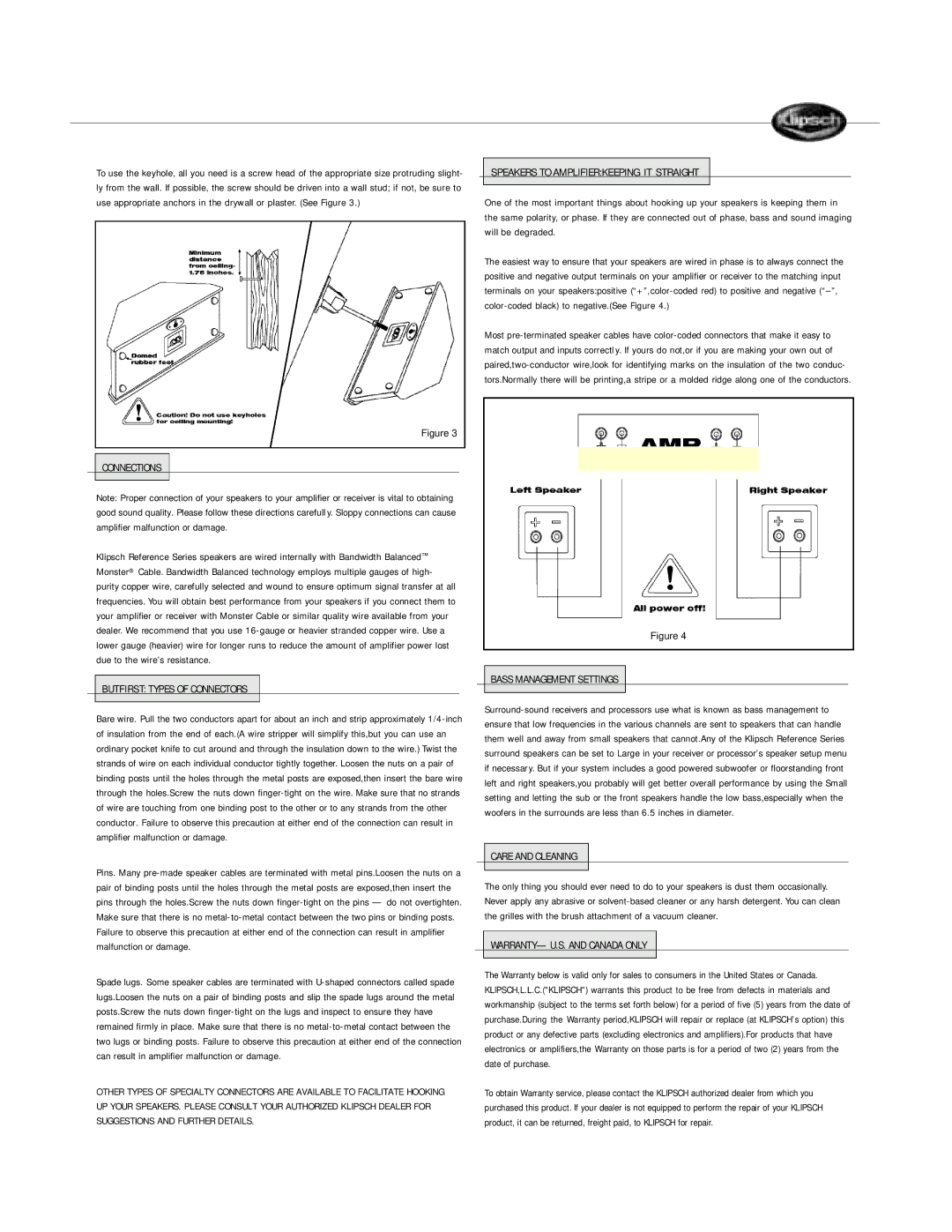To use the keyhole, all you need is a screw head of the appropriate size protruding slight- ly from the wall. If possible, the screw should be driven into a wall stud; if not, be sure to use appropriate anchors in the drywall or plaster. (See Figure 3.)
Figure 3
CONNECTIONS
Note: Proper connection of your speakers to your amplifier or receiver is vital to obtaining good sound quality. Please follow these directions carefully. Sloppy connections can cause amplifier malfunction or damage.
Klipsch Reference Series speakers are wired internally with Bandwidth Balanced™ Monster® Cable. Bandwidth Balanced technology employs multiple gauges of high- purity copper wire, carefully selected and wound to ensure optimum signal transfer at all frequencies. You will obtain best performance from your speakers if you connect them to your amplifier or receiver with Monster Cable or similar quality wire available from your dealer. We recommend that you use 16-gauge or heavier stranded copper wire. Use a lower gauge (heavier) wire for longer runs to reduce the amount of amplifier power lost due to the wire’s resistance.
BUTFIRST: TYPES OF CONNECTORS
Bare wire. Pull the two conductors apart for about an inch and strip approximately 1/4-inch of insulation from the end of each.(A wire stripper will simplify this,but you can use an ordinary pocket knife to cut around and through the insulation down to the wire.) Twist the strands of wire on each individual conductor tightly together. Loosen the nuts on a pair of binding posts until the holes through the metal posts are exposed,then insert the bare wire through the holes.Screw the nuts down finger-tight on the wire. Make sure that no strands of wire are touching from one binding post to the other or to any strands from the other conductor. Failure to observe this precaution at either end of the connection can result in amplifier malfunction or damage.
Pins. Many pre-made speaker cables are terminated with metal pins.Loosen the nuts on a pair of binding posts until the holes through the metal posts are exposed,then insert the pins through the holes.Screw the nuts down finger-tight on the pins — do not overtighten. Make sure that there is no metal-to-metal contact between the two pins or binding posts. Failure to observe this precaution at either end of the connection can result in amplifier malfunction or damage.
Spade lugs. Some speaker cables are terminated with U-shaped connectors called spade lugs.Loosen the nuts on a pair of binding posts and slip the spade lugs around the metal posts.Screw the nuts down finger-tight on the lugs and inspect to ensure they have remained firmly in place. Make sure that there is no metal-to-metal contact between the two lugs or binding posts. Failure to observe this precaution at either end of the connection can result in amplifier malfunction or damage.
OTHER TYPES OF SPECIALTY CONNECTORS ARE AVAILABLE TO FACILITATE HOOKING UP YOUR SPEAKERS. PLEASE CONSULT YOUR AUTHORIZED KLIPSCH DEALER FOR SUGGESTIONS AND FURTHER DETAILS.
SPEAKERS TO AMPLIFIER:KEEPING IT STRAIGHT
One of the most important things about hooking up your speakers is keeping them in the same polarity, or phase. If they are connected out of phase, bass and sound imaging will be degraded.
The easiest way to ensure that your speakers are wired in phase is to always connect the positive and negative output terminals on your amplifier or receiver to the matching input terminals on your speakers:positive (“+”,color-coded red) to positive and negative (“–”, color-coded black) to negative.(See Figure 4.)
Most pre-terminated speaker cables have color-coded connectors that make it easy to match output and inputs correctl y. If yours do not,or if you are making your own out of paired,two-conductor wire,look for identifying marks on the insulation of the two conduc- tors.Normally there will be printing,a stripe or a molded ridge along one of the conductors.
Figure 4
BASS MANAGEMENT SETTINGS
Surround-sound receivers and processors use what is known as bass management to ensure that low frequencies in the various channels are sent to speakers that can handle them well and away from small speakers that cannot.Any of the Klipsch Reference Series surround speakers can be set to Large in your receiver or processor’s speaker setup menu if necessary. But if your system includes a good powered subwoofer or floorstanding front left and right speakers,you probably will get better overall performance by using the Small setting and letting the sub or the front speakers handle the low bass,especially when the woofers in the surrounds are less than 6.5 inches in diameter.
CARE AND CLEANING
The only thing you should ever need to do to your speakers is dust them occasionally. Never apply any abrasive or solvent-based cleaner or any harsh detergent. You can clean the grilles with the brush attachment of a vacuum cleaner.
WARRANTY— U.S. AND CANADA ONLY
The Warranty below is valid only for sales to consumers in the United States or Canada. KLIPSCH,L.L.C.("KLIPSCH") warrants this product to be free from defects in materials and workmanship (subject to the terms set forth below) for a period of five (5) years from the date of purchase.During the Warranty period,KLIPSCH will repair or replace (at KLIPSCH’s option) this product or any defective parts (excluding electronics and amplifiers).For products that have electronics or amplifiers,the Warranty on those parts is for a period of two (2) years from the date of purchase.
To obtain Warranty service, please contact the KLIPSCH authorized dealer from which you purchased this product. If your dealer is not equipped to perform the repair of your KLIPSCH product, it can be returned, freight paid, to KLIPSCH for repair.

